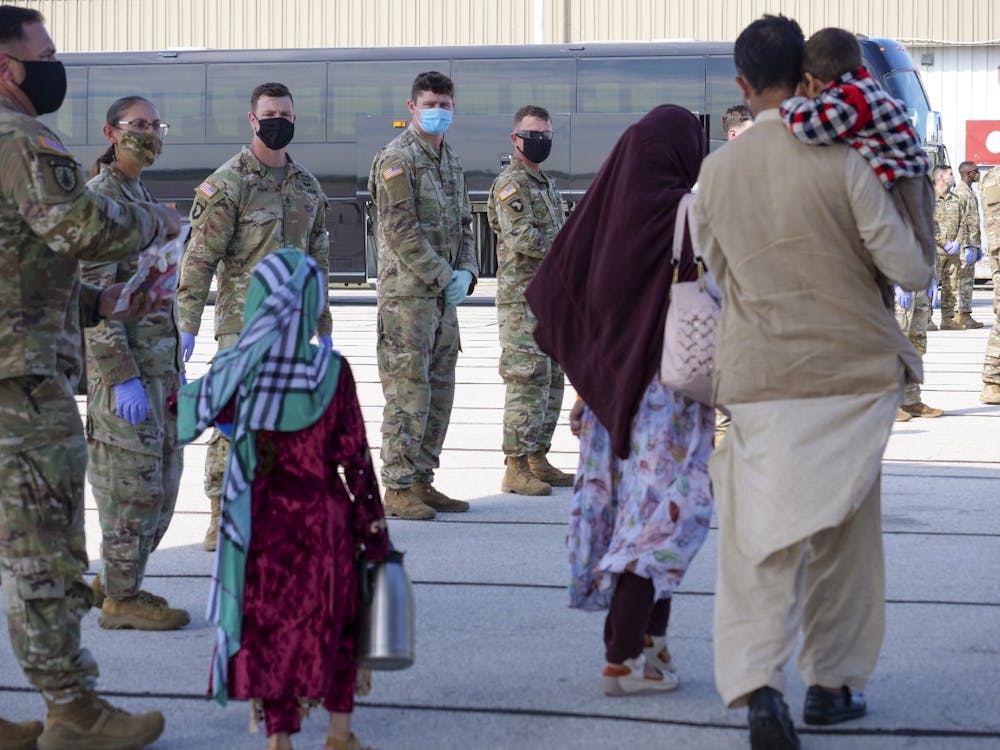Due to the recent overtaking of the Afghanistan government by Taliban forces, Indiana Gov. Eric Holcomb announced Sept. 1 Camp Atterbury, an Indiana National Guard operated training base, will hold up to 5,000 Afghan refugees.
The first refugees arrived on Sept. 6 and will receive temporary housing and social services. Each refugee participates in an intense vetting process as well as a 14-day medical screening before permanently resettling across the nation.
Releasing a statement on Aug. 29, Indiana Republican Sen. Mike Braun was quick to respond to Indiana’s welcoming of Afghan refugees. Braun seemingly disguises xenophobia with worries of “transparency in the vetting process” and the safety of Indiana residents. By not acknowledging historical facts regarding the United States’ intervention into Afghanistan, Braun’s statement falsely characterizes Afghan refugees.
We must stand with refugees as they face the perils of immigrating to a new country instead of immediately questioning their character.
“It is extremely important that all local units of government and first responders know who they are, how many, and what part of the vetting process they’re in so Hoosiers do not suffer the fallout of President Biden’s disastrous withdrawal,” Braun said in a statement.
Although questioning the vetting process of refugees and calling for communication with local authorities is not inherently harmful, the vetting process for Afghan refugees entering the United States is extremely comprehensive.
Biomedical background checks are conducted in Afghanistan, often including voice prints, iris scans and facial photos. Additionally, refugees toward the end of their vetting process while in Afghanistan are permitted to finish their vetting process in the United States. Many refugees are relocated to a third country, such as Qatar or Kuwait, where they are subjected to an additional rigorous vetting process before arrival to the United States.
Many Afghan refugees entering the United States aided the U.S. armed forces as interpreters and translators and are being offered Special Immigrant Visas. The remaining Afghan refugees, including many who fear persecution by staying in Afghanistan, may seek asylum or enter the U.S. for a temporary period through humanitarian parole.
“I have communicated to the relevant federal departments that vetting details and any plans for resettlement must be transparent and public so we can honor our commitments to our Afghan allies while keeping Hoosier communities safe,” Braun said in the statement.
Referring to topics such as transparency and safety of Hoosiers appears like an attempt to mischaracterize Afghan refugees as perpetrators of violence, setting the tone for how the public will view them before they touch ground in Indiana.
But the question remains, why do some people feel threatened by the presence of Afghan refugees?
Our safety is not being threatened by the arrival of Afghan immigrants, but the influence of harmful rhetoric like Braun’s threatens the safety of Afghan refugees.
Braun has seemingly decided to spread fear of Afghan refugees instead of utilizing his position to aid them. In his insidious comments, Braun has failed to acknowledge the U.S.’s part in the destruction of Afghanistan, seemingly blinded by ideology rooted in American exceptionalism.
“It seems a valid question to ask whether the United States can claim much moral authority internationally after handing Afghanistan, and its millions of hapless citizens, back to the custody of the Taliban,” reporter Jon Lee Anderson, who is covering the crisis in Afghanistan, said in the New Yorker.
The ruination of Afghanistan did not happen overnight, but rather it was the result of decades of failed American intervention. Afghanistan President Hamid Karzai was frequently critical about the United States’ overbearing political influence in Afghanistan, referring to the unexpected consequences of the U.S.’s attempt to keep Afghan politics intact.
The consequences of the U.S.’s attempt to establish a Western democratic model, or “fix” the government in Afghanistan, is exemplified by the Taliban’s new rule of Afghanistan, making the U.S.’s involvement a failure.
After refugees were forced to leave their home country to seek safety from the Taliban forces, Braun’s unjustified comments do nothing but enhance feelings of isolation already associated with immigrating to a foreign country.
As Hoosiers, it is essential to take a step back and understand the historical context behind the situation before being quick to judge the moral character of any refugee coming into the United States.
Russ Hensley (he/him) is a junior studying international law and institutions and Chinese language and culture with a double minor in mathematics and Spanish. He is involved with Indiana University Chinese Flagship, TEDxIndianaUniversity and the Hamilton Lugar School's Global Student Seven. Russ aspires to attend law school after his capstone year in China.




